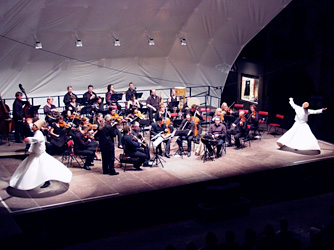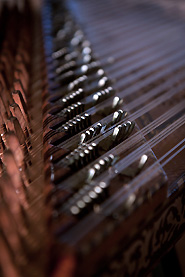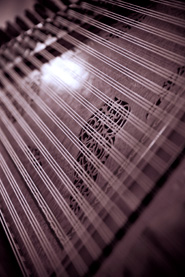Music for Emperors and Sultans
In worldwide collaboration with orchestras

Sarband designed this program
for a joint concert with the Bremen Philharmonics
under the direction of Markus Poschner.
Together with him, Sarband have performed this program
with many new orchestras,
last with the Dresden Philharmonics.
The claim to world dominion, represented by world music,
is valid in Orient and Occident.
Ludwig van Beethoven's «Eroica», originally dedicated to world conqueror Napoleon Bonaparte,
meets contemporaneous music for the «Lords of the Horizons», the Ottoman Sultans;
Dede Efendi, the «Turkish Beethoven», meets his German fellow composer, Beethoven.
Music as a display of power is certainly on of the most successful means of political representation.
First and foremost,
European rulers were inspired by the old Oriental ceremonials,
but Eastern rulers also increasingly oriented themselves by
European courts.
Consequently, a continuous and fruitful cultural exchange ensued.
The Ottoman Turks had always placed great value on a large state and military music ensembles,
which since the 17th century
served as a model for European military bands
and as «Janissary music» substantially influenced the 'alla turca' style
of Vienna classicism.
These bands consisting of up to nine small and large shawms (zurna, kaba zurna), trumpets (boru),
cymbals (zil),
small and large timpani (naqqara, kös) and drums (davul) played during every public appearance of the Sultan,
accompanied armies in battle and ambassadors on their diplomatic missions.
But also in the Sultans seraglio music was an important means of representation.
Small chamber music ensembles
(Ince Saz, «gentle instruments») played during the sessions of the privy council (Divan),
during every meal and
evening party, and to entertain the ladies of the harem.
The Turkish Sultans understood the playing and composing
of music as an essential part of their imperial dignity.
They did not only promote distinguished musicians,
but also contributed to Ottoman musical culture
both as composers and as performers.
Reviews
«Under the direction of Markus Poschner, the orchestra [Dresden Philharmonic]
performed with the multinational ensemble
Sarband, in a way both sensitive and stirring.
... a subtle dialogue, atmospherically evocative ... a delight for audience and
musicians.
Across all differences in form and sound, parallels and kinships could be discovered.
Turkey was not an
exporting country in a musical sense, but, in turn, absorbed Western currents.
The audience has rarely ever applauded
so persistently and so cordially.» Karsten Blüthgen,
Sächsische Zeitung (Germany), 30.01.2012


